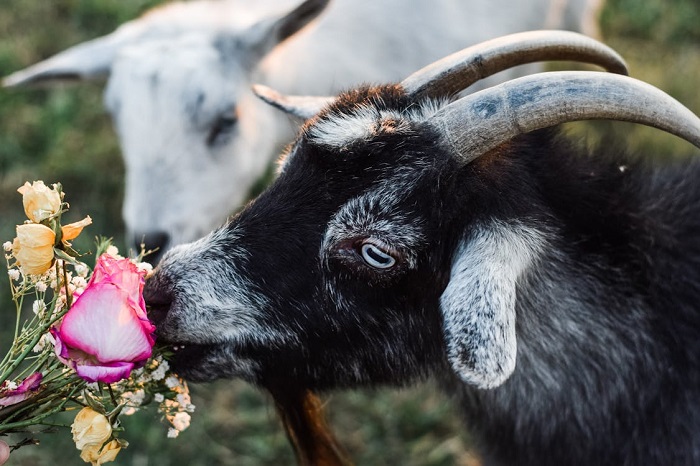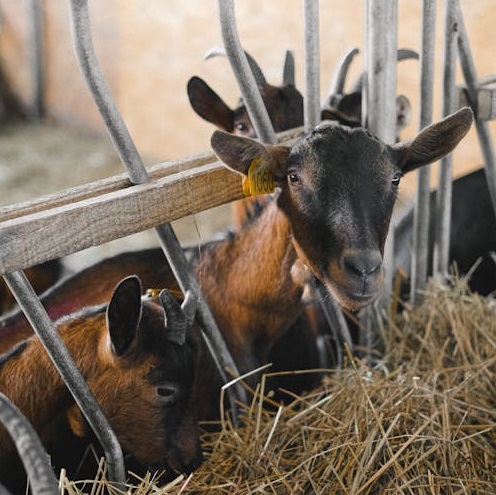Sharing your garden’s beauty with your goats can be a delightful way to bond. But with a vast array of flowers and plants, it’s crucial to ensure these colorful companions are safe for your caprine friends. So, the question arises: can goats eat zinnias? Unfortunately, the answer isn’t a simple yes or no. While zinnias aren’t inherently toxic and some sources might suggest they’re safe, it’s best to err on the side of caution and avoid offering them to your goats. This guide will explore the reasons behind this recommendation and provide alternative safe and delicious options to keep your goats happy and healthy.
Why You Shouldn’t Feed Zinnias to Your Goat
Since zinnias aren’t recommended for goat consumption, there aren’t any specific health benefits associated with feeding them.
Here’s why zinnias might not be the best choice for your goat’s diet:
- Lack of Nutritional Value: Zinnias are primarily decorative flowers and offer little to no nutritional value for goats. They’re low in protein, essential vitamins, and minerals that goats need for optimal health.
- Potential for Stomach Upset: The digestive system of a goat is designed to handle specific types of roughage and browse. While not inherently toxic, ingesting zinnias might cause digestive upset, bloating, or diarrhea, especially if consumed in large quantities.
- Risk of Choking: The large flower heads of zinnias could pose a choking hazard, particularly for younger goats.
- Pesticide Contamination: Commercially available zinnias might have been treated with pesticides or herbicides. These chemicals can be harmful to your goats if ingested.
- Uncertainties Remain: While some sources claim zinnias are safe for goats, there isn’t enough definitive research to guarantee their safety. It’s always better to be safe than sorry.

How Often Should You Feed Your Goat Zinnias?
Considering the potential drawbacks, it’s best to avoid offering zinnias to your goats altogether. Their diet should focus on high-quality hay, balanced commercial feed, and safe browse options.
Can Baby Goats Eat Zinnias?
Just like adult goats, baby goats, or kids, shouldn’t be given zinnias. Their digestive systems are even more delicate and susceptible to upset from unfamiliar foods. Stick to a milk replacer formulated for kids and age-appropriate commercial feed until their digestive systems mature around 3-4 months old.
What Other Foods Can Goats Eat?
Goats are natural browsers and thrive on a variety of delicious and nutritious options:
- Grasses: A variety of grasses like orchard grass, brome, and fescue make up a significant portion of a goat’s diet. Ensure the grasses haven’t been treated with herbicides or pesticides before allowing your goats to graze.
- Weeds: Many common weeds like dandelions, clover, and plantain are safe and nutritious for goats. However, always identify weeds correctly before offering them to your goats, as some can be toxic.
- Shrubs: Goat-safe shrubs like willow, hazelnut, and blackberry bushes can be excellent sources of browse. Ensure the shrubs haven’t been treated with herbicides or pesticides before allowing your goats access to them.
- Fruits and Vegetables: Goats can enjoy occasional treats of fruits and vegetables like apples, pears, carrots, and pumpkins. Remember, these should be offered sparingly as treats, not dietary staples.
- Hay: High-quality hay provides essential fiber and roughage, especially during winter months when fresh forage is scarce. Choose hay varieties like alfalfa for growing goats and grass hay for adult maintenance.
Important Note: Always introduce new foods gradually to avoid digestive upset.

How To Give Your Goat A Healthy And Balanced Diet
Creating a balanced diet for your goats is key to their overall health and well-being. Here are some essential components:
- High-Quality Hay: Hay should be the foundation of your goat’s diet, providing them with the necessary fiber for proper digestion. Aim for at least 2-3 pounds of hay per adult goat daily.
- Commercial Feed: A balanced commercial goat feed formulated for their specific age and life stage fills nutritional gaps and ensures they receive essential vitamins and minerals that might be lacking in their regular forage. Follow the feeding guidelines on the feed bag based on your goat’s weight and activity level.
- Fresh Water: Clean, fresh water is vital for all animals, including goats. Ensure they have constant access to a clean water source.
- Mineral Lick: A mineral lick provides essential minerals like calcium, magnesium, and sodium that might be lacking in their regular diet. Choose a commercially available mineral lick specifically formulated for goats.
- Browse: Offering a variety of safe browse options like grasses, weeds, and approved shrubs can enrich your goat’s diet and provide them with mental stimulation. However, prioritize hay and commercial feed for their core nutritional needs.
- Limited Treats: Occasional treats like fruits and vegetables can be offered in moderation. Remember, these are not replacements for a balanced diet.
Consulting a Veterinarian:
For personalized dietary advice specific to your goat’s breed, age, and health condition, consulting with a veterinarian is highly recommended.
Final Verdict: Zinnias – Pretty But Not on the Goat Menu
Zinnias, with their vibrant colors and cheerful faces, might seem like a tempting addition to your goat’s diet. However, due to the lack of nutritional value, potential for digestive upset, and choking hazard, it’s best to avoid offering them to your goats altogether.
Focus on providing a balanced diet rich in high-quality hay, age-appropriate commercial feed, fresh water, and essential minerals. There are plenty of safe and delicious browse options and treats available to keep your goats happy and healthy. Remember, a healthy goat is a curious and playful goat, and that’s a joy to witness in any backyard farm!

